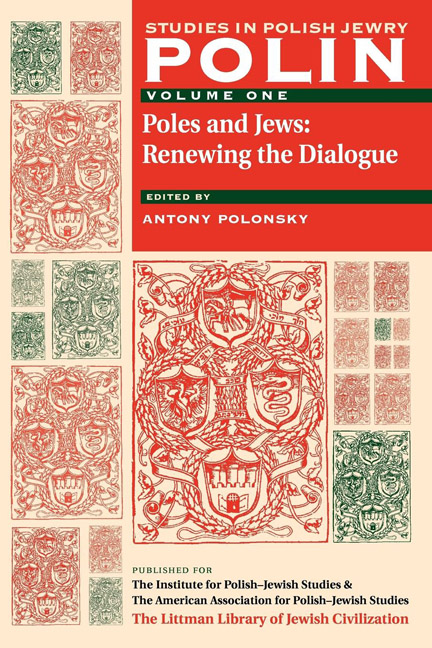Book contents
- Frontmatter
- Dedication
- Editors and Advisers
- Contents
- Polin
- Statement From the Editors
- ARTICLES
- The Reconstruction of Pre-Ashkenazic Jewish Settlements in the Slavic Lands in the Light of Linguistic Sources
- Jewish Perceptions of lnsecurity and Powerlessness in 16th-18th Century Poland
- Some Basic Characteristics of the Jewish Experience in Poland
- The Changes in the Attitude of Polish Society Toward theJews in the 18th Century
- Eros and Enlightenment: Love Against Marriage in the East European Jewish Enlightenment
- Polish-Jewish Relations and the January Uprising: The Polish Perspective
- Loyalty to the Crown or Polish Patriotism? The Metamorphoses of an Anti-Polish Story of the 1863 Insurrection
- The Polish Revolt of 1863 and the Birth of Russification: Bad for the Jews?
- A Turning Point in the History of Polish Socialism and its Attitude Towards the Jewish Question
- The Question of the Assimilation of Jews in the Polish Kingdom (1864-1897): An Interpretive Essay
- The Secular Appropriation of Hasidism by an East European Jewish Intellectual: Dubnow, Renan, and the Besht
- Some Methodological Problems of the Study of Jewish History in Poland Between the Two World Wars
- Jews and Poles in Yiddish Literature in Poland Between the Two World Wars
- Is There a Jewish School of Polish Literature?
- The Underground Movement in Auschwitz Concentration Camp
- DOCUMENTS
- INTERVIEW
- A DIALOGUE
- BIBLIOGRAPHICAL ESSAYS
- BOOK REVIEWS
- CONTRIBUTORS
The Polish Revolt of 1863 and the Birth of Russification: Bad for the Jews?
from ARTICLES
- Frontmatter
- Dedication
- Editors and Advisers
- Contents
- Polin
- Statement From the Editors
- ARTICLES
- The Reconstruction of Pre-Ashkenazic Jewish Settlements in the Slavic Lands in the Light of Linguistic Sources
- Jewish Perceptions of lnsecurity and Powerlessness in 16th-18th Century Poland
- Some Basic Characteristics of the Jewish Experience in Poland
- The Changes in the Attitude of Polish Society Toward theJews in the 18th Century
- Eros and Enlightenment: Love Against Marriage in the East European Jewish Enlightenment
- Polish-Jewish Relations and the January Uprising: The Polish Perspective
- Loyalty to the Crown or Polish Patriotism? The Metamorphoses of an Anti-Polish Story of the 1863 Insurrection
- The Polish Revolt of 1863 and the Birth of Russification: Bad for the Jews?
- A Turning Point in the History of Polish Socialism and its Attitude Towards the Jewish Question
- The Question of the Assimilation of Jews in the Polish Kingdom (1864-1897): An Interpretive Essay
- The Secular Appropriation of Hasidism by an East European Jewish Intellectual: Dubnow, Renan, and the Besht
- Some Methodological Problems of the Study of Jewish History in Poland Between the Two World Wars
- Jews and Poles in Yiddish Literature in Poland Between the Two World Wars
- Is There a Jewish School of Polish Literature?
- The Underground Movement in Auschwitz Concentration Camp
- DOCUMENTS
- INTERVIEW
- A DIALOGUE
- BIBLIOGRAPHICAL ESSAYS
- BOOK REVIEWS
- CONTRIBUTORS
Summary
The Polish uprising of 1863 was a traumatic event for Russian society. It was an early warning that the reform era in Russia - which had touched the Kingdom of Poland as well - would not immediately solve all the problems of Russian society. The events of the revolt itself, and the proPolish diplomatic effort it produced, provoked a wave of patriotism and heightened national feeling in Russia. A central feature of this new mood was a determination to deal with the Polish Question once and for all. Proposals to this end, made by prominent Russian journalists such as M. N. Katkov and I. S. Aksakov, came to be known collectively as 'Russification'. A standard assumption in the secondary literature is that policies of Russification had dire consequences for national minonties in the Russian Empire. This claim has been made particularly strongly in the case of the Jews. Writing in a general sense, the great Russian-Jewish historian S. M. Dubnow declared: ‘The insurrection was not only followed by a general wave of political reaction, but it also gave a strong impetus to the policy of Russification which was now applied with particular vigour to the western provinces, and was damaging to the Jews both from the civil and the cultural point of view.’ Louis Greenberg is more specific still:
Russian public opinion and influential government officials … favored Jewish rights in the first period of Alexander's reign and it was largely the emperor's determined opposition that prevented legal equality with the rest of the population. Toward the middle of the sixties, however, these elements became less friendly and the movement for Jewish emancipation consequently suffered a serious setback. Largely responsible for this unfavorable change on the part of the press and the government was the Polish uprising in 1863, which affected adversely all national minorities in Russia. This rebellion intensified the patriotism of the Russian people and alienated those previously sympathetic to the Jewish cause. Influential Russian papers like Kievlianin (The Kievite), Golos (The Voice) and Vilenskii vestnik (The Wilno Messenger), which first favored civil rights for Jews, reversed their stand after the uprising.
- Type
- Chapter
- Information
- Poles and Jews: Renewing the Dialogue , pp. 96 - 110Publisher: Liverpool University PressPrint publication year: 2004



